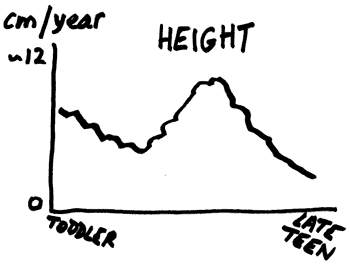Your cart is currently empty!

Weight gain in growth spurts, and why it matters in eating disorder treatment
How much weight do teens gain during growth spurts?
Last week I asked ChatGPT: 'How much weight do teens gain during growth spurts?' ChatGPT apologised. It didn't know anything about growth spurts, or about the more technical term, 'weight velocity'. Google did a bit better. But its top results were vague or misleading or relating to infants. It took some digging to find any science.
And here's why I'm writing this page. The extent of weight gain in normal adolescent growth spurts is not common knowledge.
When your child is being treated for an eating disorder, how often do you discuss whether they've had a growth spurt yet? Or whether they're likely to be due one soon? In my experience, not often.
It's as though there's an assumption that if a growth spurt happens, the weight gain won't be that significant.
But are you aware that growth is not normally smooth, and a growth spurt could be, say 10kg in a single year?
The 30 second summary
- We should expect every young person to have a growth spurt, some time in their tweens or teens.
- Typically a growth spurt is roughly three years of significantly faster growth in height and in weight.
- Some youngsters get tall before they fill out, and others fill out before they get tall.
- Very rough ballpark: during a growth spurt, in one year, height gain may be 10cm, and weight gain may be 10 kg (that's 1.5 stone or 20 pounds). Either could be less, or more — we can't predict it for your child.
- There are many variables. there is too much uncertainty, for anyone — even medical experts — to predict an individual's healthy weight.
- You'll only know your child has reached the weight their body needs when they get there. So focus on the work of recovery, and get cracking with recovering lost weight, if you've not already done so.
Why am I writing about growth spurts?
Parents, my intention in bringing up growth spurts is to drive home the message that you should not get attached to any weight target. It's like getting attached to a weather forecast. Your child can cope if the sun that was forecast never materialised. But with anorexia, it's extra hard to raise any stated weight number.
Clinicians, I hope you find this post helps you with your practice. See links at the end for my other posts on weight goals, median BMI, percent weight-for-height, use of growth charts, and all those tricky topics. Parents will want certainties, understandably, so I hope my examples, my graphics, will help you to help them make peace with uncertainty.

One thing the eating disorder world does know about growth spurts
Clinicians may mention growth spurts, quite rightly, as one of the triggers for anorexia. 'Maybe your child got into energy deficit because of their growth spurt.' In other words, your child shot up, but the eating and the weight lagged behind.
If your child hasn't yet had a growth spurt, then expect one
If your clinicians give your child a weight target — and I'm not a fan (do they give a target for iron, for B12, for blood pressure?) — then they absolutely must explain how uncertain this is. Mentioning growth spurts is one way of bringing home the message.
Sometimes a clinician might have a rule of adding on a couple of kilos, or 10 percent, to their healthy weight prediction, as a small buffer in case of illness or growth spurt.
Yet growth spurts are to be expected, and they can be big. There's a whole range of ages, from tween to late teen, when a big growth spurt is likely to happen. Maybe your child has already had one.
What growth spurt can I expect for my child?

While you can expect a growth spurt to happen, there is no rule about when it will happen for your child, and how big it will be. Like everything to do with nature, there are ranges.
There are many factors that bring variability. Children just grow at different rates at different times.
So any prediction of a healthy weight for your child is likely to be so uncertain it's not worth having. If it turns out to be too low, if people are overly confident in its accuracy, if no further action is taken, you're likely to see your child stay 'stuck' in the illness.
'Are we there yet?!'
People with anorexia tend to focus on exact numbers. As their parents we get caught up in that too. We need to embrace a 'wait and see' approach. Meanwhile, focus on the work of recovering lost weight, plus all the other tasks of treatment.
Think about other markers of health. Mood, behaviours, and fatigue are affected by low iron levels, for example, just as they are by low weight. Yet we don't tend to obsess over an iron target. We get on with the work of restoring good iron reserves, and when we feel good again, we know that whatever rough level we achieved is what suits us.
Does it matter, if my child is due a growth spurt?
Imagine that today, your child reached the 'target weight' that someone predicted would be their healthy weight — yay! You adjust meals to start easing off on the weight gain.
Little do you know that actually, your child's body is programmed to start a growth spurt in the next few months. It wants loads more weight right now, to fuel that growth spurt. If your youngster didn't have an eating disorder, their hunger would be driving them to eat more than ever. But your child isn't yet allowing themselves to honor their hunger. Worse, their biological signals for hunger and fullness have got derailed by weight loss.
So your child's body, far from being weight restored, is in energy deficit. And this maintains the eating disorder. You're seeing low mood, eating disorder behaviours, distorted beliefs.
So remember: your child's target weight has so much uncertainty attached to it, it might be very wrong. Keep discussing symptoms with your clinicians. It takes time and expertise to work out the most likely sensible steps to take for your child at this time.
When to expect a growth spurt, and how much gain in height and weight?
So, you want to support whatever weight gain your child needs if they're due to have a growth spurt. But how much? When?
Any numbers I mention on this page are just to give you an order of magnitude. My aim is to drive home the concept of uncertainty, not to create new false certainties!
Weight and height 'velocity' data started coming in with Tanner et al (1965) and Tanner et al (1976). There's been a few other small studies. To my knowledge, studies are all too small and too ancient and too regional to justify any attachment to numbers. For example, the age of puberty is starting earlier, these days.
Besides, those studies were not designed to predict any child's growth, but to indicate whether any individual's growth rate is within normal expectations.
What age to expect a growth spurt?


During the years between 11 and 17, a teenager will have roughly three years of particularly high growth in height and in weight– the growth spurt. Some kids are late maturers, some are early, and most are in between.
If you plot a child's rise in height and in weight, you'll get a kind of mountain (see my rough drawings).
No doubt there is some variability after the growth spurt. From Tanner's data I get the impression that a youth might stop growing. Or they might keep growing, but more slowly than pre-growth-spurt. Again, the studies are so small…
How much gain in height and in weight during the growth spurt?
I was going to offer some ballpark numbers, plucked from Tanner's data.
But what's the point, if I keep telling you the studies are small and that you have to make peace with uncertainty?
Let's say, don't be surprised if a young person shoots up by 10cm in a year, and gains 10kg of weight.
The peak height velocity and the peak weight velocity don't happen at the same time!
If you're interested in growth spurts and in the history of how BMI has become such a ubiquitous tool, I highly recommend podcast 'Unpacking weight science' by the impressive non-diet dietitian Fiona Willer. Episode 3 'How we got here: BMI meets death' is what alerted me to quite how significant growth spurts are. Do listen for yourself.
As you'll hear in that podcast, the top speeds in weight and height do not necessarily happen at the same time.
"Some kids get tall before they fill out, and others fill out before they get tall."
So we're dealing with many unknowns. We could be pathologising a child for 'excess weight' when they're in the process of a normal and necessary growth spurt. Can you imagine the damage done by restricting their diet?! Oh, no need to imagine. Government policies are making that happen every day.
is anorexia interrupting a pre-programmed growth spurt?
What if your child was due a growth spurt while they have, say, anorexia? What if their body's biological clock was programmed for rapid growth, but there's not enough food?
As the growth spurt — at least in terms of weight — is hampered, my guess is that the body will strive for a big catchup as soon as food is available again. Indeed some children have a fast rise in height as meals start coming in. If the weight gain is prematurely allowed to stop or to slow down, the body will send out distress signals. Go and seek the food! We still need to grow fast! Is there still a famine around here? With the tension this creates, it makes sense to me that the eating disorder would be strongly activated.
Even without growth spurts, adults in recovery often describe how they experienced 'extreme hunger' and they talk of a need for overshoot.
Alert: growth charts don't show growth spurts
'Hang on', you might say, 'don't those percentile charts account for growth spurts?'
Well, no. Because healthy kids don't all grow at that nice steady rate shown on those charts. Some deviate a bit from their centile curves for height/and/or for weight. Some deviate a lot, and don't return to childhood centiles.
I explain this in my post here.
So what's the weight target for my child?
I conclude my post 'Weight-restoration: why and how much weight gain?' by suggesting that we cannot know a recovery weight until we're roughly there. If your child's mood and behaviours are 'stuck', even though you're attending to all aspects of treatment (not just nutrition and weight gain) then it's a no-brainer to experiment with more weight.
So keep an open mind. If you were given a target weight, know that it's so uncertain it's hardly worth having. Most likely, you will need to proceed in experimental steps and review.
More sources
Dr Fiona Willer's podcast 'Unpacking weight science' Episode 3 'How we got here: BMI meets death'
Tanner JM, Whitehouse RH, Takaishi M.(1966) Standards from birth to maturity for height, weight, height velocity, and weight velocity: British children, Part I. Archives of Disease in Childhood. 1966 Oct;41(219):454-471. DOI: 10.1136/adc.41.219.454. PMID: 5957718; PMCID: PMC2019592.
Tanner, J. M., Whitehouse, R. H., & Takaishi, M. (1966). Standards from birth to maturity for height, weight, height velocity, and weight velocity: British children, Part II. Archives of disease in childhood, 41(220), 613–635.
Tanner, J. M., & Whitehouse, R. H. (1976). Clinical longitudinal standards for height, weight, height velocity, weight velocity, and stages of puberty. Archives of disease in childhood, 51(3), 170–179. https://doi.org/10.1136/adc.51.3.170
Growth percentile charts from the US Centers for Disease Control and Prevention (CDC): https://www.cdc.gov/growthcharts/charts.htm
The World Health Organization (WHO) also has percentile charts. It also has 'weight velocity charts', but only for children up to 24 months old.
And more from me about weight:
- My page Weight centile growth charts: why they can’t predict your child’s recovery weight to emphasize that even growth charts are statistical instruments
- My main page on all aspects of weight-restoration in ‘Weight-restoration: why and how much weight gain?’
- Numerous quotes from esteemed researchers, clinicians and professional organisations, all stating that goal weight should be based on your individual's child's history as well as their current needs: all gathered in Experts say, "Recovery weight should be individualized" Yet middle-size-fits-all targets are still common
- My YouTube: ‘Growth charts and goal weights made simple’ shows you how a child's height or weight data are tracked on a growth chart. But please remember how this still leaves you with much uncertainty.
Last updated on:

LEAVE A COMMENT (parents, use a nickname)